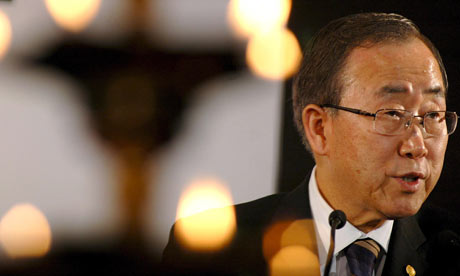China and India signal opposition to binding limits on emissions as UN secretary general says developing world 'must do more'

UN secretary general Ban Ki-moon speaks during the Delhi Sustainable Development Summit. Photograph: STR/EPA
Environmentalists have strongly criticised attempts to "strong arm" developing countries such as India into a binding commitment to cut greenhouse gas emissions after the United Nations secretary general asked poorer nations to "get on board" with the industrialised world to find solutions to the climate crisis.
Ban Ki-moon told the Delhi Sustainable Development Summit that although "Brazil has been taking a quite proactive role in the implementation of biofuel and forestation policies. China and India have also taken steps. But that is not enough, they have to do more."
The UN's top official said that climate change was a "common and shared" responsibility and that the time for arguments about who caused and contributed to global warming was over.
"We should not argue who is more responsible, who is less responsible, who should do more… This is a common, shared responsibility," Ban said.
There appears a global consensus over the impact of global warming. Wheat yields are down, water is becoming scarcer and the frequency and severity of floods and droughts are increasing. Ban's clarion call in Delhi comes in a year which will end with a deadline to negotiate a global treaty to combat climate change. The current phase of the Kyoto protocol runs out in 2012.
But talks have run aground as industrialised countries have refused to reduce their greenhouse gas emissions unless emerging economies such as China and India commit to an emissions cap.
Both India and China, which have per capita emissions that are a fraction of the west, have pointed out the Kyoto protocol was supposed to mean emission reduction targets of 5% by 2012 but between 1990 and 2005, emissions had increased. In fact, US emissions have increased 20% during that period.
Earlier this week Chinese prime minister Wen Jiaobao said in an interview that it was "difficult for China to take quantified emission reduction quotas at the Copenhagen conference, because this country is still at an early stage of development… Europe started its industrialisation several hundred years ago, but for China, it has only been dozens of years."
India has also signalled its strong opposition to binding limits on emissions. The Indian prime minister, Manmohan Singh, has said that India would be willing to undertake to keep its per capita emissions below those of industrialised countries, thus giving the latter a strong incentive to reduce their emissions as quickly as possible.
The Centre for Science and Environment, an influential thinktank based in Delhi, has also pointed out that "the stock of greenhouse gases in the atmosphere was built up over centuries in the process of creating nations' wealth. This is the natural debt of nations, and they must pay up."
Others criticised the United Nations for foisting an "ineffectual" Clean Development Mechanism on the developing world, which aims to allow rich nations claim credit for emissions reductions they fund in poorer nations. Himanshu Thakkar, co-ordinator at the South Asia Network on Dams, Rivers & People, said that India needed "no lectures from the west which has been polluting (for decades). We have also looked at the UN and seen the CDM (Clean Development Mechanism) as completely inefficient. We have seen no new technology being used in India and no benefit to anyone but big companies."
However, the United Nation's top climate change official Yvo de Boer told reporters that to get developing countries to sign up for emission limits public money from the wealthy world would be needed to fund climate change action programmes.
In December the UN said said $86bn £59bn a year will be needed by 2015 for poor countries to adapt to global warming but admitted that it was struggling to raise even the fund's administration costs of $4m.
The Indian prime minister's advisers on climate change told the Guardian that countries such as Britain were "pushing hard" for India to adopt experimental technologies and using cash as an incentive. "They have been pushing Carbon Capture and Storage. But these are not proven technologies. What happens if the gas leaks out and causes deaths?"

No comments:
Post a Comment